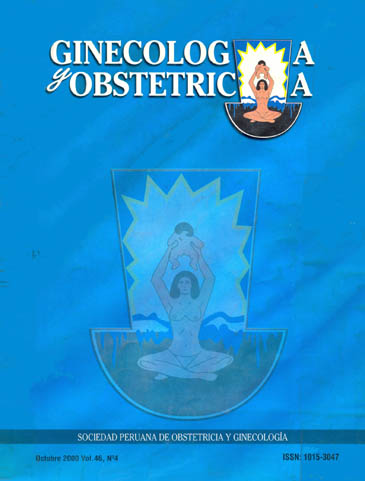Estrogen receptor in operable breast cancer with negative axillary lymph
DOI:
https://doi.org/10.31403/rpgo.v46i914Abstract
OBJECTIVES: To determine the prognostic significance of the state of estrogen receptor (ER) and identify prognostic factors related to the five-year survival in patients with operable breast cancer with negative axillary nodes (CMOGAN). DESIGN: Retrospective. MATERIALS AND METHODS: 37 patients undergoing CMOGAN classical radical mastectomy (n = 28) or modified (n = 9) is evaluated in the Bethlehem Hospital from 1966 to 1995. estrogen receptor status was determined according to immunohistochemical method standard. RESULTS: The mean age was 48 ± 11.1 years. Four cases it had thirty-three stage I and stage II. Seven cases were ER (+) and thirty RE (-). In patients with ER (-) by univariate analysis using the log-rank test, only the type of mastectomy was significantly related to the five-year survival (p = 0.046). In the multivariate Cox analysis, histological grade (p = 0.0361), nuclear grade (p = 0.0361) and miotic index (p = 0.0239) were factors statistically associated with survival. The five-year survival in patients with CMOGAN and RE (+) was 100% and in patients RE (-) 65%. CONCLUSION: The histological and nuclear grade, and mitotic index significantly influence the survival of patients with CMOGAN and RE (-).Downloads
Download data is not yet available.
Downloads
Published
2015-06-14
How to Cite
Villar Tejada, P., Zavallos, M., Díaz, J., Tantaleán, E., Vilela, C., & Peláez, R. (2015). Estrogen receptor in operable breast cancer with negative axillary lymph. The Peruvian Journal of Gynecology and Obstetrics, 46(4), 303–311. https://doi.org/10.31403/rpgo.v46i914
Issue
Section
Artículos Originales
















